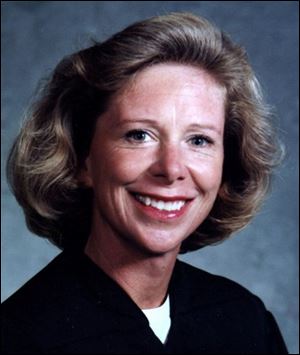
Ohio's Republicans to seek conservative for high-court seat
3/23/2003
Justice Cook: Headed for federal seat.
COLUMBUS - When Ohio Supreme Court Justice Deborah Cook makes her long-delayed ascent to the federal bench, Republicans will likely be looking for someone with a similar conservative viewpoint in picking her replacement.
Anticipating her confirmation by the U.S. Senate to the 6th District Court of Appeals, Gov. Bob Taft is accepting applications through Friday to replace her.
But few expect him to appoint someone with a judicial philosophy significantly different from that of Justice Cook, considered the most conservative of the current justices.
The two front-runners are reportedly former Cleveland appellate judge Terrence O'Donnell of Rocky River, who has already launched his second campaign for the high court, and Medina appellate Judge William G. Batchelder, a staunch conservative who served 30 years in the Ohio House.
The runner-up could be the party's choice to run next year for the seat to be vacated by Justice Francis Sweeney, a Democrat barred from seeking another term because of his age.
Republicans hope to expand their partisan and philosophical control of the court to 5-2.
Four seats in all will be on the ballot, including three GOP incumbents - Chief Justice Thomas Moyer, Justice Paul Pfeifer, and Justice Cook's appointed replacement.
“I'm more interested in electability, someone who has a track record in running for judicial office and being able to raise money,” said Ohio Republican Party Chairman Bob BenNett.
He said he would be surprised if Mr. Taft strayed from the party's list of preferences.
Further down on that list are several other appellate judges: Judith Lanzinger of the Toledo-based Sixth District, Stephen W. Powell of the Middletown-based 12th District, Sheila G. Farmer of the Canton-based Fifth District, Mark Painter of the Cincinnati-based First District, and Stephen Shaw of the Lima-based Third District.
Significantly absent, at least so far, are any African Americans.
“It sounds so embarrassing that there have been only two African Americans on the highest court in the state in our 200-year history,” said state Sen. Ray Miller (D., Columbus). “Both were appointed. Then we haven't had anyone for 30 years.”
The first black justice was Robert M. Duncan, a Republican appointed in 1969 who was appointed two years later to the U.S. District Court bench.
The second, Lloyd O. Brown, a Democrat appointed in 1971, served little more than a year.
Mr. Taft's choice could also end the short-lived female majority on the court, created with the election of Republican Maureen O'Conner in November.
Although she has yet to be tested, Justice O'Connor's election to replace Toledo Republican Andy Douglas appears to have reversed the court's 4-3 “activist” majority that struck down the state's school-funding system as well as legislative attempts to limit jury awards in product liability, medical malpractice, and other litigation.
Dr. John Green, political science professor at the University of Akron, said both Judges O'Donnell and Batchelder would appeal to the conservative element of the GOP.
“[Judge Batchelder] might be too conservative for some parts of Ohio,” he said. “He's fairly well known in this area.
To the core constituents of the Republican Party, he would be ideal. There's no guile in him. He's very straightforward, something a lot of people appreciate, whether you agree with him or not.”
If appointed, Judge Batchelder would have the advantage of incumbency in 2004.
The more moderate Judge O'Donnell, on the other hand, has proven he can raise money for a campaign.
In 2000, he ran unsuccessfully for the seat held by Justice Alice Robie Resnick, an Ottawa Hills Democrat who became the focus of a business-financed negative ad campaign.
Dr. Green said he does not believe Mr. O'Donnell was permanently stained by the backlash.
“He ran a pretty decent campaign, but he ended up being blamed for some truly evil acts out there,” he said.
“It was not so much to punish Terrence O'Donnell as a person as it was support for Resnick because voters felt she was being mistreated,” he said.
To be eligible to be a justice, an applicant must be a lawyer who has practiced at least six years.
There is no mandate that the lawyer must have prior judicial experience.